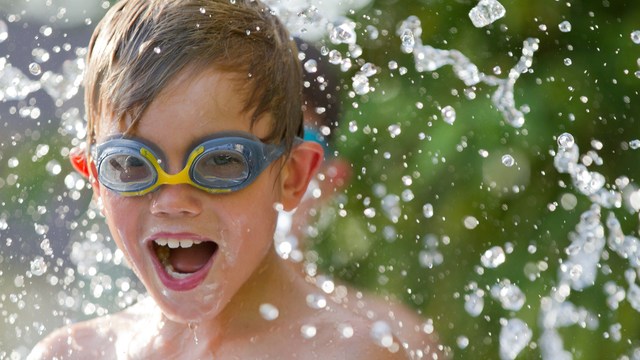 Christophe ROLLAND/PhotoSpin
Christophe ROLLAND/PhotoSpin
Someone I know once referred to public swimming pools as "one giant toilet" which gave me the dry heaves. But he had a point. With non-toilet-trained toddlers and lazy children (and adults!) in the water, swimming pools may not be the most sanitary places to relax, despite regular cleanings.
Time Magazine reported on a CDC study that monitored the bacteria levels of 161 private and public swimming pools and parks in the Atlanta region last year. The results were troubling to say the least.
About half of the pools contained E. coli, stemming from bowel movements passed in the water or unclean bodies that cause fecal matter to end up in the pool.
Most swimming pools ask that a person showers before entering the water. This is to wipe off any tanning oils that can cause a slight slick in the water.
It also rids the body of as much fecal matter as possible -- fecal matter that remains if the body is not carefully cleaned after a bowel movement. (This fully justifies my insistence that all my children use a wet baby wipe to finish personal cleaning!)
Even regular pool cleanings aren't enough. Making sure ill people stay away from the water (in case they cannot control their bowels properly) and making sure children are vigilant about not using the pool as a toilet is really important.
Another problem arises when babies are not wearing proper swim diapers. Regular diapers do not work in pools and are not made to be submerged. Failure to ensure that these swim diapers are regularly checked and changed can pose a health risk. Regular checking of the water content by staff is also mandatory.
The Time article also listed some key recommendations by the CDC:
"- Take bathroom breaks every 60 minutes.
- Wash your hands after using the toilet or changing diapers.
- Try not to swallow the pool water."
There are several ways to keep a pool clean although no pool can be guaranteed 100 percent free of any germ or bacteria. But removing any visible materials can keep the pool free of tangible substances and the water should be clear to look at.
If the water looks dirty, or has slime, foam or a oily slick on the top, it's not clean. You should be able to see through the water clearly.
Using appropriate chlorine levels is also a way to lower the risk of any kind of infection from E. coli. There should be about 1-4 parts per million of chlorine.
Chlorine can kill off E. coli quickly, within about a minute, and the hepatitis A and Giardia parasite in under an hour. Other parasites can take days to kill so again, checking the water for bacteria and parasites is really important. These cannot be seen with the naked eye.
Do you ever see staff taking pool samples? They are doing that to check bacteria, chlorine and pH levels, which should be 7.2 to 7.8. Home pools should also be inspected this way. If the water of a pool isn't clear, don't swim in it.
There are also other hazards we need to look at with swimming this summer. One special hazard is child drowning. No matter the amount of warnings issued every year, a shocking number of children lose their lives in swimming pools annually.
I wrote an article for EmpowHER several years ago, noting the fact that about 300 children die every year from drowning in pools and over 2,000 more end up in hospitals from near-drownings. Most, about 75 percent, are toddlers between 1 and 3 years old and half are under the supervision of adults at the time of drowning.
Seventy-five percent of the drowned children had only been missing for five minutes or less. There is simply no safe way to leave a small child for any reason, especially when there is a pool nearby.
Sixty-five percent of children who drown every year do so in their own private pools. The use of gates, locks, flotation devices, alarms and hands-on care are a non-negotiable necessity when it comes to the safety of our children around water.
We wish everyone a safe summer!
Tell Us
Do you have a pool? What safeguards do you take?
Sources:
Time. Health and Family. "Don’t Drink the Pool Water! It Contains a Surprising Amount of…Human Waste." Web. Retrieved May 28, 2013.
http://healthland.time.com/2013/05/16/dont-drink-the-pool-water-it-conta...
EmpowHER.com. Relationships and Family. Parenting. Web. Retrieved May 27, 2013. "Let's Have a Safe Summer - your Swimming Pool or Splash Pool Safety."
https://www.empowher.com/community/share/lets-have-safe-summer-your-swim...
Reviewed May 31, 2013
by Michele Blacksberg RN
Edited by Jody Smith




Add a Comment1 Comments
Be safe when swimming for your dental health as well.
Here is an article regarding dental health and swimming I wrote last summer on my blog.....
Dental Health And Swimming
June 5, 2013 - 7:04pmThis Comment